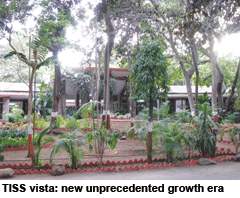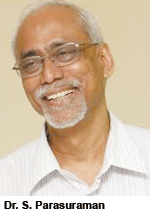Founded in 1936, TISS has evolved into India’s top social sciences university reputed for academic and research excellence. Last year TISS celebrated its platinum jubilee with deserved aplomb
 Sited on two green campuses in Mumbai’s north-eastern suburb of Deonar, the Tata Institute of Social Sciences (TISS) is widely acknowledged as India’s premier institution for higher education and research in the social sciences. Founded in 1936 as Sir Dorabji Tata Institute of Social Work with 20 students and renamed Tata Institute of Social Sciences in 1944, this pioneer institution was conferred deemed university status in 1964 and awarded a 5-star ‘A’ grade rating by the National Assessment and Accreditation Council (NAAC) in 2010.
Sited on two green campuses in Mumbai’s north-eastern suburb of Deonar, the Tata Institute of Social Sciences (TISS) is widely acknowledged as India’s premier institution for higher education and research in the social sciences. Founded in 1936 as Sir Dorabji Tata Institute of Social Work with 20 students and renamed Tata Institute of Social Sciences in 1944, this pioneer institution was conferred deemed university status in 1964 and awarded a 5-star ‘A’ grade rating by the National Assessment and Accreditation Council (NAAC) in 2010.
Last year, TISS celebrated its platinum jubilee with aplomb staging a national conference, alumni meet, memorial lecture, art exhibition and other cultural programmes to commemorate its evolution into India’s top-ranked social sciences university reputed for academic and research excellence. Among the institute’s well-known alumni are social activist Medha Patkar; Anu Aga, chairman Thermax Industries; Purnima Mane, president of Pathfinder Inter-national and Adil Malia, president (human resources) of the Essar Group.
“Last year was a year of celebration, reflection, and consolidation for TISS. In the light of this momentous journey of 75 years, as we survey the entirety of its reach — both geographically and in terms of action and research — one sees the institute’s steady evolution into a premium multifaceted institution. Like the tree that has become our logo, TISS has branched out into diverse areas of action, pedagogy, and research, while being rooted firmly in the fast-changing developmental context. This year also marks a period of reflection reminding us of the increasing social relevance of our institution in today’s world; and at the same time a period of consolidation, in preparation for a new era of unpreced-ented growth,” says Dr. S. Parasuraman, director, TISS. An alumnus of Pune and Mumbai universities and the Intern-ational Institute of Social Studies, The Hague, Parasuraman served as the Asian regional policy coordinator, Action Aid International, Bangkok, before taking charge as director of TISS in 2004.
 TISS, which receives a Rs.45 crore annual grant from University Grants Commission, is essentially a post-graduate institution with its ten schools (education; management and labour studies; rural development; social work; health systems studies; habitat studies; law, rights and constitutional gover-nance; vocational education; devel-opment studies; media and cultural studies) offering over 18 postgraduate, doctoral and certificate programmes to 2,000 students. TISS also boasts four independent centres — human ecology, social exclusion and inclusive policies, lifelong learning and research method-ology. Moreover India’s first institute of social work has established collab-orative research and student exchange programmes with over 25 universities and consortiums in Africa, Asia, the US and Europe. Its academic and research activities apart, TISS is an important training and capacity building partner of the Union government and inter-national development organisations.
TISS, which receives a Rs.45 crore annual grant from University Grants Commission, is essentially a post-graduate institution with its ten schools (education; management and labour studies; rural development; social work; health systems studies; habitat studies; law, rights and constitutional gover-nance; vocational education; devel-opment studies; media and cultural studies) offering over 18 postgraduate, doctoral and certificate programmes to 2,000 students. TISS also boasts four independent centres — human ecology, social exclusion and inclusive policies, lifelong learning and research method-ology. Moreover India’s first institute of social work has established collab-orative research and student exchange programmes with over 25 universities and consortiums in Africa, Asia, the US and Europe. Its academic and research activities apart, TISS is an important training and capacity building partner of the Union government and inter-national development organisations.
TISS is spread across five campuses, two in Mumbai and one each in Tuljapur, Hyderabad and Guwahati. The Mumbai campuses host 1,400 Masters and 320 doctoral students with 180 full-time faculty members. The main campus in Deonar is spread over ten acres and houses the schools of social work, social sciences, health systems, as also the independent centres for lifelong learning, media and cultural studies, research methodology, resource centres and administrative offices. The Sir Dorabji Tata Memorial Library stocks 103,000 volumes, subscribes to 200 journals and has 1,600 audio-visual materials. The second 11-acre Naoroji (Mumbai) campus, on Deonar Farm Road overlooking the Trombay hills, houses the schools of habitat studies, mana-gement and labour studies as also the Jamsetji Tata Centre for Disaster Management. Apart from a dining hall, canteen and student hostels, the campus boasts a modern convention centre with a 500-seat auditorium.
In 1986, TISS began construction of a third campus in Tuljapur, in the Osmanabad district of Maharashtra. Spread over 100 acres, it houses a school of rural development, library, hostels and guest house. Currently the campuses in Hyderabad and Guwahati are housed in temporary accommodation and offer certificate courses in decen-tralised planning and rural development plus diploma programmes in community organisation and development practice. All three campuses will launch a five-year integrated Masters programme in social sciences from June this year.
According to Parasuraman, the distinguishing feature of TISS post-graduate education is rigorous curri-culums combining theoretical and experimental learning delivered by highly qualified faculty deeply engaged in research. “The Masters programmes integrate classroom teaching with on-field projects and internships. In the academic year 2011-2012, a total of 179 research and documentation projects were ongoing at the institute and 228 papers written by our faculty were published in renowned journals and publications,” he says.
Having crossed the platinum jubilee milestone year, the TISS management is looking to consolidate and expand its academic menu and research activities. On the drawing board are plans to spin off TISS’ school of vocational education into a National Vocational University (NVU) encompassing 19 schools, with pan India coverage and three regional campuses verticals by 2014-15; intro-duction of an integrated B.Ed-M.Ed programme at the Tuljapur, Guwahati and Hyderabad campuses from 2013; setting up of an incubation centre to foster entrepreneurship among TISS graduates, and redesign of the social work curriculum. “All our present and future endeavours will be focused on fulfilling our mission — to create knowledge, work closely with State and non-state institutions, and strive to produce conscientious graduates committed to building a just and equitable society,” says Parasuraman.
|
Admission and fees
TISS’ ten schools offer a wide range of Masters, doctoral and certificate programmes. It also offers a BA programme in social work.
Admission forms for the BA programme are available in the month of January and the entrance exam is conducted in May.
Application forms for MA degree programmes are available by end September and an all-India entrance exam is held in the second week of December. Interviews are held around March. Admission into the integrated M.Phil/Ph D programme is made once every academic year (June/July), and direct admission into Ph D programmes is made twice a year (in June/July and January/Feb).
Hostel facilities are provided in the Mumbai and Tuljapur campuses.
Tuition fees (full course): Rs.85,000-160,000; Hostel fees (each semester): Rs.9,250; Dining hall charges: Rs.14,400
For further information contact Tata Institute of Social Sciences, V.N. Purav Marg, Deonar, Mumbai 400088. Tel: 91-22-25525000; Fax: +91-22-25525050;
e-mail: infosrd@tiss.edu; website: www.tiss.edu
|
Kalpana Rangan (Mumbai)